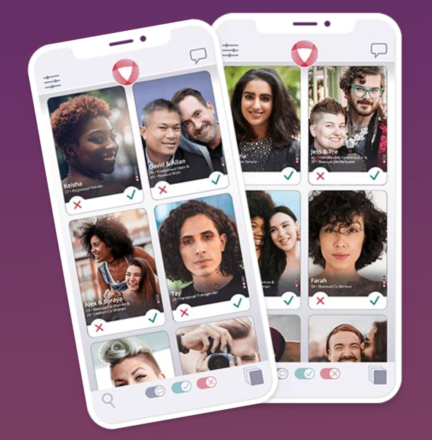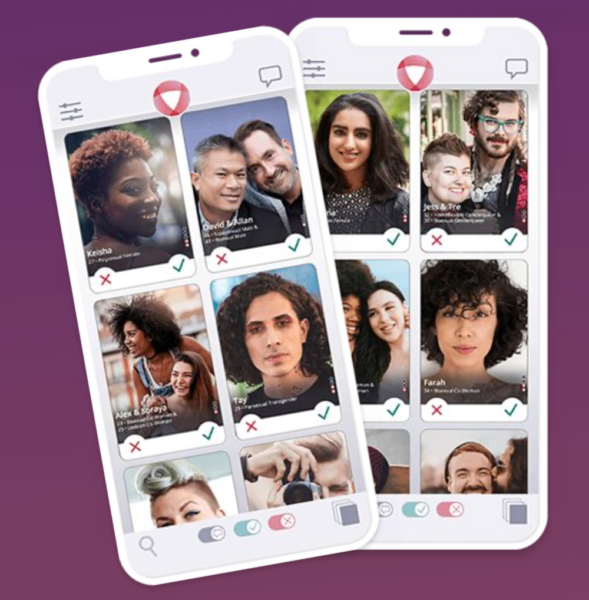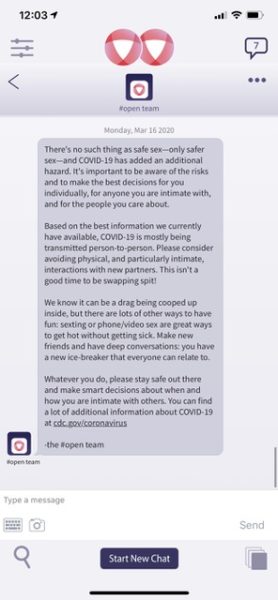Arts & Entertainment
Dating app encourages users to make ‘virtual’ connections


A dating app is telling its users that “now is not the time” for meeting up in person and encouraging them to use their platform to explore virtual relationships instead.
A relative newcomer among the array of dating apps, #open was launched by co-founders Amanda Wilson and David Epstein, who themselves met on a dating app in 2015 and decided to build one of their own a year later. By 2018, their brainchild was in the Apple app store, and Android began offering it in April of 2019. Since then, it has grown to serve over 48,000 users – with an impressive 43,000 matches made.
What makes this app different from Grindr or Tinder, or any of the other better-known players in the game?
According to Epstein, “As our name implies, it’s an app that’s been built for people with a fairly open mindset, when it comes to human sexuality.”
A look at the wide array of identities and orientations among their users (besides offering 24 different gender identities and 23 sexual orientations to choose from, the app also lets you enter your own), as well as the high percentage of people identifying as being in non-traditional relationships, gives a clear picture of why #open has a unique appeal.
Epstein elaborates, “The one thing the users have in our community have in common, more than anything else, is that 95% of our users identify as being in some kind of an open relationship – whether that’s the 28% that are polyamorous or the 5% that consider themselves ‘monogom-ish’ or anything in between.’ That’s the common thread.”
Perhaps the fledgling app’s targeted focus accounts for the growth in its numbers, but with the last two months seeing a particular rise in both new user profiles and user interactions, it’s likely also a reflection of coronavirus fears beginning to drive people online in greater numbers. Whatever the reason behind it, the company’s co-founders want to live up to their core value as an “honest dating app” and make sure its swelling membership is practicing “social distancing” by getting to know potential partners remotely instead.
As Wilson puts it, “People right now are trying to figure out how they’re going to maintain their connection and their community, and their social lives, and apps are meeting one of those needs, obviously. We’ve been saying for a while that dating has been changing, and now this is going to bring more change, for a little bit.”
With that in mind, she says, the company made the decision to send out a message to all of its users on Monday, “urging them to remember that there is no safe sex, there is only safer sex, and that now is not the time to be swapping spit with people, and to stay home.”
Epstein elaborates further, “We’re a sex positive app, and the people in our community understand the incredible importance of transparency – especially when you’re talking about people in polyamorous relationships, or practicing ethical non-monogomy. And of course, we have huge at-risk populations here. We just don’t think you can play it too safe right now.”

Rather than using the app to arrange intimate in-person encounters, the company suggests taking an opportunity to work on aspects of dating that are often ignored in our age of instant gratification.
“We really think it’s a time to explore communicating,” says Epstein, “through the app, or through Facetime or any of the other tools people have available to them on their smart phones.”
“Relationships are all about communication,” Wilson interjects. “So, you know, swipe right more often, talk to people that you wouldn’t necessarily usually talk to.”
“And you know it doesn’t have to be boring,”she adds. “There are things that you can do to spice up your lives when you’re stuck inside.”
“If you are exploring your sexuality,” Epstein elaborates, “we think this is a time to explore it in a virtual way.”
Anyone with a smart phone and a libido is sure to understand exactly the kind of thing they are hinting at, and though it may not be as good as “IRL” for a lot of us, it’s definitely something to explore as a means of getting through what could be a long haul of ethical self-isolation.
“We need to lean into the long game,” Wilson stresses. “In this day and age when you can get anything at any time, within a couple of hours, we’re used to immediacy – but now we can get to know people again, and play around with delayed gratification.”
Epstein interjects, “There will be a lot of delayed gratification built up on the other side of this, and that’s not necessarily a bad thing.”
Wilson, with a similarly positive attitude, sums the situation up.
“We’re going to be in our own homes for a while now – and that’s okay. Dating will rebound.”
Books
Love or fear flying you’ll devour ‘Why Fly’
New book chronicles a lifetime obsession with aircraft

‘Why Fly’
By Caroline Paul
c. 2026, Bloomsbury
$27.99/256 pages
Tray table folded up.
Check. Your seat is in the upright position, the airflow above your head is just the way you like it, and you’re ready to go. The flight crew is making final preparations. The lights are off and the plane is backing up. All you need now is “Why Fly” by Caroline Paul, and buckle up.

When she was very young, Paul was “obsessed” with tales of adventure, devouring accounts written by men of their derring-do. The only female adventure-seeker she knew about then was Amelia Earhart; later, she learned of other adventuresome women, including aviatrix Bessie Coleman, and Paul was transfixed.
Time passed; Paul grew up to create a life of adventure all her own.
Then, the year her marriage started to fracture, she switched her obsession from general exploits to flight.
Specifically, Paul loves experimental aircraft, some of which, like her “trike,” can be made from a kit at home. Others, like Woodstock, her beloved yellow gyrocopter, are major purchases that operate under different FAA rules. All flying has rules, she says, even if it seems like it should be as freewheeling as the birds it mimics.
She loves the pre-flight checklist, which is pure anticipation as well as a series of safety measures; if only a relationship had the same ritual. Paul loves her hangar, as a place of comfort and for flight in all senses of the word. She enjoys thinking about historic tales of flying, going back before the Wright Brothers, and including a man who went aloft on a lawn chair via helium-filled weather balloons.
The mere idea that she can fly any time is like a gift to Paul.
She knows a lot of people are terrified of flying, but it’s near totally safe: generally, there’s a one in almost 14 million chance of perishing in a commercial airline disaster – although, to Paul’s embarrassment and her dismay, it’s possible that both the smallest planes and the grandest loves might crash.
If you’re a fan of flying, you know what to do here. If you fear it, pry your fingernails off the armrests, take a deep breath, and head to the shelves. “Why Fly” might help you change your mind.
It’s not just that author Caroline Paul enjoys being airborne, and she tells you. It’s not that she’s honest in her explanations of being in love and being aloft. It’s the meditative aura you’ll get as you’re reading this book that makes it so appealing, despite the sometimes technical information that may flummox you between the Zen-ness. It’s not overwhelming; it mixes well with the history Paul includes, biographies, the science, heartbreak, and exciting tales of adventure and risk, but it’s there. Readers and romantics who love the outdoors, can’t resist a good mountain, and crave activity won’t mind it, though, not at all.
If you own a plane – or want to – you’ll want this book, too. It’s a great waiting-at-the-airport tale, or a tuck-in-your-suitcase-for-later read. Find “Why Fly” and you’ll see that it’s an upright kind of book.
The Blade may receive commissions from qualifying purchases made via this post.
Theater
Out actor Kevin Cahoon on starring role in ‘Chez Joey’
Arena production adapted from Broadway classic ‘Pal Joey’

‘Chez Joey’
Through March 15
Arena Stage
1101 Sixth St., S.W.
Tickets start at $93
Arenastage.org
As Melvin Snyder in the new musical “Chez Joey,” out actor Kevin Cahoon plays a showbiz society columnist who goes by the name Mrs. Knickerbocker. He functions as a sort of liaison between café society and Chicago’s Black jazz scene circa 1940s. It’s a fun part replete with varied insights, music, and dance.
“Chez Joey” is adapted from the Broadway classic “Pal Joey” by Richard Rodgers and Lorenz Hart. It’s inspired by John O’Hara’s stories based on the exploits of a small-time nightclub singer published in The New Yorker.
A warm and humorous man, Cahoon loves his work. At just six, he began his career as a rodeo clown in Houston. He won the Star Search teen division at 13 singing songs like “Some People” from “Gypsy.” He studied theater at New York University and soon after graduating set to work playing sidekicks and comedic roles.
Over the years, Cahoon has played numerous queer parts in stage productions including “Hedwig and the Angry Inch,” “La Cage aux Folles,” “Rocky Horror” as well as Peanut in “Shucked,” and George the keyboardist in “The Wedding Singer,” “a sort of unicorn of its time,” says Cahoon.
Co-directed by Tony Goldwyn and the great Savion Glover, “Chez Joey” is a terrific and fun show filled with loads of talent. Its relevant new book is by Richard Lagravenese.
On a recent Monday off from work, Cahoon shared some thoughts on past and current happenings.
WASHINGTON BLADE: Is there a through line from Kevin, the six-year-old rodeo clown, to who we see now at Arena Stage?
KEVIN CAHOON: Anytime I want to land a joke in a theater piece it goes back to that rodeo clown. It doesn’t matter if it’s Arena’s intimate Kreeger Theatre or the big rodeo at the huge Houston Astrodome.
I was in the middle stadium and there was an announcer — a scene partner really. And we were doing a back and forth in hopes of getting laughs. At that young age I was trying to understand what it takes to get laughs. It’s all about timing. Every line.
BLADE: Originally, your part in “Chez Joey” Melvin was Melba who sings “Zip,” a clever woman reporter’s song. It was sort of a star feature, where they could just pop in a star in the run of “Pal Joey.”
CAHOON: That’s right. And in former versions it was played by Martha Plimpton and before her Elaine Stritch. For “Chez Joey,” we switched gender and storyline.
We attempted to do “Zip” up until two days before we had an audience at Arena. Unexpectedly they cut “Zip” and replaced it with a fun number called “I Like to Recognize the Tune,” a song more connected to the story.
BLADE: Wow. You must be a quick study.
CAHOON: Well, we’re working with a great band.
BLADE: You’ve played a lot of queer parts. Any thoughts on queer representation?
CAHOON: Oh yes, definitely. And I’ve been very lucky that I’ve had the chance to portray these characters and introduce them to the rest of the world. I feel honored.
After originating Edna, the hyena on Broadway in “The Lion King,” I left that to do “Hedwig and the Angry Inch” as standby for John Cameron Mitchell, doing one show a week for him.
Everyone thought I was crazy to leave the biggest musical of our time with a personal contract and getting paid more money that I’d ever made to get $400 a week at the downtown Jane Street Theatre in a dicey neighborhood.
At the time, I really felt like I was with cool kids. I guess I was. And I never regretted it.
BLADE: When you play new parts, do you create new backstories for the role?
CAHOON: Every single time! For Melvin, I suggested a line about chorus boys on Lakeshore Drive.
BLADE: What’s up next for Kevin Cahoon?
CAHOON: I’m about to do the New York Theatre Workshop Gala; I’ve been doing it for nine years in a row. It’s a huge job. I’ll also be producing the “Cats: The Jellicle Ball” opening on Broadway this spring; it’s a queer-centric uptown vogue ball with gay actor André de Shields reprising his role as “Old Deuteronomy.”
BLADE: There’s a huge amount of talent onstage in “Chez Joey.”
CAHOON: There is. I’m sharing a dressing room with Myles Frost who plays Joey. He won accolades for playing Michael Jackson on Broadway. We’ve become great friends. He’s a miracle to watch on stage. And Awa [Sal Secka], a D.C. local, is great. Every night the audience falls head over heels for her. When this show goes to New York, Awa will, no doubt, be a giant star.
BLADE: Do you think “Chez Joey” might be Broadway bound?
CAHOON: I have a good feeling it is. I’ve done shows out of town that have high hopes and pedigree, but don’t necessarily make it. “Chez Joey” is a small production, it’s funny, and audiences seem to love it.

The Capital Pride Alliance held the annual Pride Reveal event at The Schuyler at The Hamilton Hotel on Thursday, Feb. 26. The theme for this year’s Capital Pride was announced: “Exist. Resist. Have the audacity!”
(Washington Blade photos by Michael Key)











































